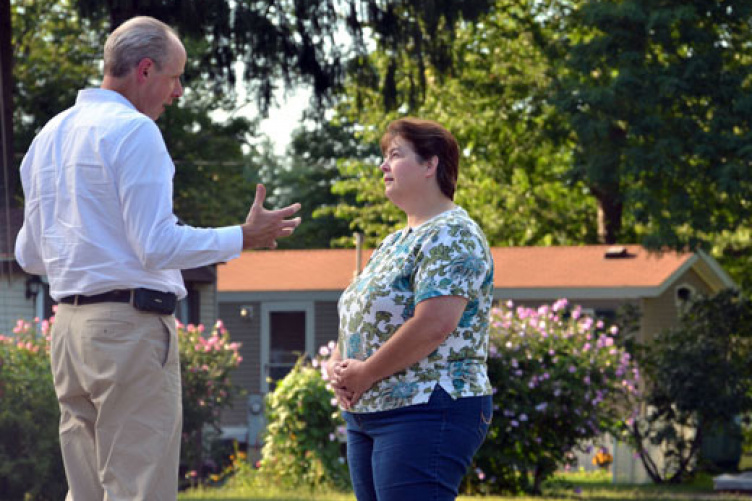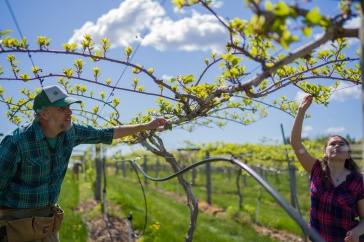
Paul Bradley talks with Bonnie Rose at Powder House Cooperative in Exeter.
Paul Bradley, ’86, president of ROC USA LLC, has been named the Carsey 2013 Social Innovator of the Year. Bradley will be honored and presented his award at the New Hampshire Social Business and Microfinance Forum Monday, Sept. 30, 2013 at the University of New Hampshire.
The Carsey Social Innovator of the Year Award recognizes a New England business leader with a demonstrated commitment to social innovation and business. Social innovators combine the passion and purpose of a social or environmental mission with the rigor and accountability of a market-based approach to enterprise design, financing, and operations.
|
"We are focused on doing one thing really well and doing it time and again," says ROC USA President Paul Bradley. |
“Paul Bradley has helped grow a social business that has helped thousands of people lead more secure lives by giving them a secure place to live. Paul is an innovator, critical thinker and outstanding leader. He is setting an example for how to scale a social business to serve people across the USA,” said Michael Swack, faculty director of the Carsey Institute’s Center on Social Innovation and Finance.
A native of New Hampshire, Bradley received his bachelor’s degree in economics in 1986 from the University of New Hampshire. In 2008, he graduated from the NeighborWorks America’s Achieving Excellence Program, an executive training program offered through Harvard University’s Kennedy School of Government.
Bradley is the founding president of ROC USA. ROC USA helps resident corporations buy their manufactured home communities or “mobile home parks” from private community owners. ROC USA is a nonprofit organization with a mission of making quality resident ownership possible nationwide. “Our reason for being is to help homeowners gain economic security through resident ownership of their ‘mobile home park’ or manufactured home community. We are focused on doing one thing really well and doing it time and again for no other reason than to preserve and improve affordable communities and build value for homeowners in resident-owned communities,” Bradley said.
“We know it works because we’ve helped more than 100 resident corporations secure community ownership,” he said. “We routinely hear from people who are looking to buy a home and once they learn about resident-owned communities, that’s where they want to live.”
Prior to his appointment at ROC USA, he served as vice president for the New Hampshire Community Loan Fund. There he managed the Community Loan Fund’s manufactured housing park program, expanding its cooperative development program, and initiating single-family lending and new production.
During his 16-year tenure, the number of resident-owned communities increased from 10 to 82, increasing resident ownership’s market share in New Hampshire to nearly 20 percent. To date, the now 107 communities are all performing and post-purchase training and networking activities are robust.
A 2006 report by the Carsey Institute found that residents who own their manufactured housing communities have significant advantages beyond their counterparts in investor-owned communities, as evidenced by higher average home sale prices, faster home sales, and access to fixed-rate home financing. Additionally, residents who own their communities generally perceive greater control and stability in their lot rents and governance, and worry less about being displaced because of park closure for redevelopment.
In 2008, three national nonprofits, the Corporation for Enterprise Development (CFED), NCB Capital Impact, and NeighborWorks America, joined with the Community Loan Fund to create ROC USA and make resident ownership and its benefits possible in more states. ROC USA has helped homeowners purchase 33 communities in 13 states outside of New Hampshire since its launch in May of 2008. These communities, from Washington to Maine to Texas, have preserved over 2,600 homes.
“The University of New Hampshire has been instrumental in my own journey as a social entrepreneur, as well as in the development and growth of ROC USA,” Bradley said.
Bradley has continued to draw on UNH during the years. The Carsey Institute provided technical assistance to help ROC USA build its national operating platform through a grant from the Ford Foundation. Bradley also speaks regularly to UNH classes and hosts undergraduate summer interns. (See related story.)
The Carsey Institute at the University of New Hampshire conducts policy research on vulnerable children, youth, and families and on sustainable community development. They give policy makers and practitioners the timely, independent resources they need to effect change in their communities.
Originally published by:
UNH Today
Photography by Mike Bullard
-
Written By:
Staff writer | Communications and Public Affairs




















































